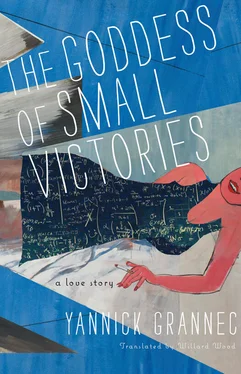One day when she had abandoned her plan to enter the Uffizi Gallery because of the interminable line, a man approached her, amused by her irritation, with an offer to jump ahead using his pass. Italy was a good fit for Anna, and she knew it. She’d followed the man, enticed by the prospect of seeing treasures forbidden to the public. They had become inseparable. Gianni was the son of a very old Florentine family. An expert in the painting of the quattrocento, he knew his city’s smallest nooks and crannies. With him, every walk was a surprise, every meal a feast, and sex joyful. When she ran out of money, he offered to give her a place to stay and take care of her needs. The transition occurred naturally: he was neither demanding nor intrusive. Uncynical, surrounded by friends, and little given to introspection, Gianni was a quiet hedonist. Life with him was simple but never dull. So as not to feel entirely kept, she had worked on a few translations and buried her sense of guilt, lulled by her comfortable existence, which was punctuated by erudite discussions and weekends by the sea.
With Gianni, she had almost managed to forget the young woman she had escaped being — intelligent but not astute, and neither uglier nor prettier than anyone else. A life with no real drama. With no great joys either. She had never been happy in that tub of lukewarm water.
Today, she had to admit that she had drifted into her rebellion more or less unwittingly. She had done nothing, decided nothing. A tourist in her own life. It had simply been easier to burn everything behind her than to accept her mediocrity. Maybe she was provoking fate by hitching a ride with someone else. One day, a great misfortune would make her miss this sweet Gaussian boredom.
32. 1946: Ambulatory Digressions Coming Back
In science one tries to tell people, in such a way as to be understood by everyone, something that no one ever knew before. But in poetry, it’s the exact opposite.
— Paul Dirac
The quiet IAS building suddenly clattered to life: chairs scraped the floor, doors were flung open, and feet shuffled in the halls. These men of science had laid down their chalk and their telephones and were hurrying to lunch like every other human being at that hour. I’d wasted all morning with the secretarial staff, but I wasn’t comfortable enough in English to navigate the administrative maze without their help. Once all this nonsense was out of the way, I would have to find myself an affordable ticket to Germany or France, then a train to Vienna, crossing a Europe that the newspapers described every day in apocalyptic terms. Leaving was relatively simple, but I would then have to get back into the United States, and our passports at this point were still German.
I knew that my husband was dead set against my visiting him at the Institute. I waited for his formal summons before entering his office. He was standing in front of his blackboard, concentrating, deaf to signals from his stomach.
“You’re not with Herr Einstein? Then the two of us can have lunch.”
He jumped. He was so predictable: I’d hoped to make him flee toward a lunch with Herr Einstein. With Albert there, Kurt wouldn’t dare not to eat.
“Or shall I just accompany the two of you along the way?”
“It would be inappropriate, Adele. He will think that I’m incapable of acting on my own.”
“He likes you too much to think anything of the kind. Put your jacket on. You’re late.”
We found Albert smoking his pipe on the steps of Fuld Hall, reading a newspaper.
“I was trying to determine the probability of seeing you appear, my friend. Luckily, your good wife has you in hand.”
“I’m making sure that he won’t escape!”
A thin man came out of the building, anxious not to be noticed. He shared with Albert a flagrant lack of vanity about his hair.
“Dirac, don’t you say hello?” 21
Hunching over a bit farther, the man came and shook the physicist’s hand. He greeted us with a slight nod and fled immediately. Einstein, sucking on his pipe, watched him retreat.
“Paul is morbidly shy. Schrödinger almost had to handcuff him to make him accept their Nobel Prize.”
“Aesthetically, Dirac’s writings are a true pleasure. No one has a more highly developed feel for mathematical elegance than he.”
“Gödel! You’re not going to start working on quantum physics, are you?”
“If I had the time, I would put my back into it, just for the pleasure of contradicting you, Herr Einstein.”
“We are both too allergic to chaos to wade into those waters.”
“Everything has an underlying logic, even chaos.”
“You can find anything with mathematics! The most important part is the content, not the mathematics.”
“Do you take me for a charlatan?”
“Good God, no! Don’t be so paranoid!”
I shuddered at hearing him use the word. Kurt didn’t notice. He was busy buttoning his overcoat.
“We should hurry, gentlemen. You’ll be late for your appointment.”
Halfway down the lawn, Kurt, now reconciled with his coat buttons, picked up the conversation where he had left off.
“A mathematical theorem exists beyond doubt. A theory of physics can never attain the same degree of absoluteness. I have great respect for you, Herr Einstein, but all your insights are considered only highly probable, given the means at present available to prove them.”
An incongruous noise escaped from the physicist’s abdomen.
“My stomach disagrees. I’m too hungry to listen to you lecture once more on the supremacy of mathematics. Dr. Gödel has given his diagnosis. I am suffering from acute incompleteness! The sole remedy is … to fill up my belly!”
“Don’t joke about my theorem. These absurdities are beneath you.”
Albert gave a backhanded slap to his newspaper.
“Simplification, conflation, anecdote, manipulation. That’s the start of glory, my friend! Every day they attribute nonsense to me that I would never say, even after a night of drinking.”
I gave Kurt a dig with my elbow. Albert knocked the ash from his pipe against the sole of his shoe.
“When a scientist is glorified, he is recognized for something that no one else understands but that everyone assumes as a matter of course. Yesterday, everything was magnetic, today it is all atomic. Children will tell you that E = mc 2before they know how to multiply. Even the milk shakes at the corner drugstore are atomic! And tomorrow everything will be quantum mechanical! People will discuss antimatter between the cheese plate and the fruit, all the while exchanging gossip about Hollywood.”
I reached out and took Albert’s briefcase as he struggled to relight his pipe and hold his newspaper at the same time.
“People have a right to try to understand.”
“Of course, dear Adele. But laymen crowd around science the way the Hebrews did around the golden calf. The mystery of complexity is gradually replacing the mystery of the divine. We are the new priests. We officiate in our white coats, with our suspicious accents! Your turn will come, my friend. One day you will become a myth.”
“I would like to see my husband signing autographs!”
“Gödel, the man who demonstrated the limits of science! Who toppled the scientific ideal!”
“I’ve never claimed anything so idiotic! I was talking about the internal limits of axiomatic systems.”
“The details are irrelevant. You are the consecrated wafer for all the pedants. They’ll toss the uncertainty principle and the incompleteness theorem into the same bag and conclude that science is not able to do everything. What great good luck! No sooner are we made into idols than we are struck down.”
“A good excuse to share nothing and keep everything among yourselves, among the elect. I thought you were more democratic, Herr Einstein.”
Читать дальше












